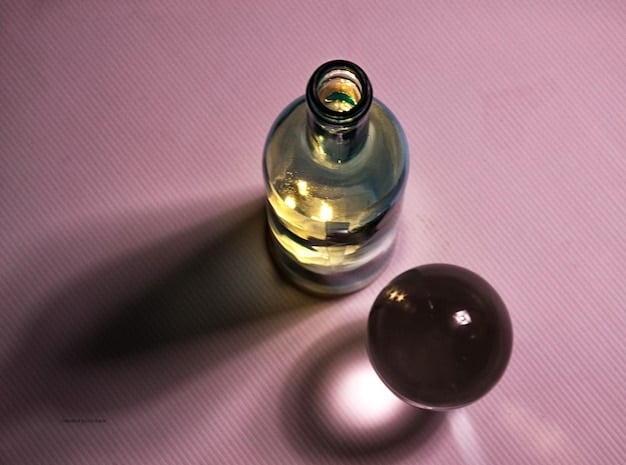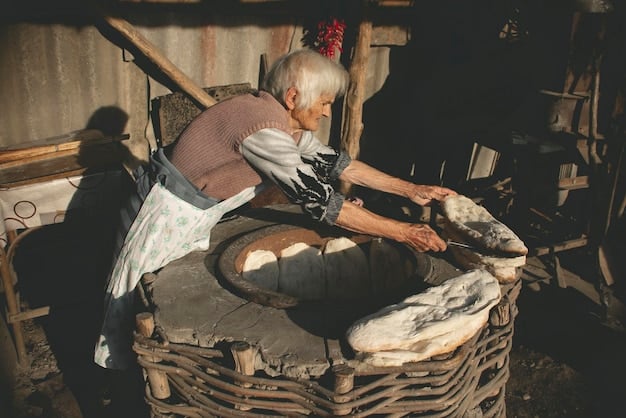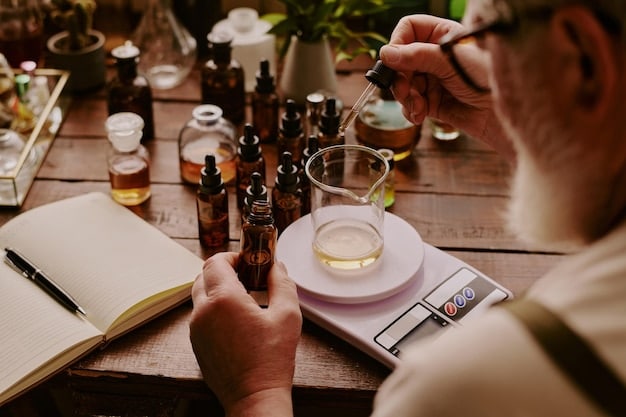Unveiling the Secret Ingredients: What Makes German Perfumes Unique?

Advertisements
German perfumes stand out due to their meticulous craftsmanship, high-quality ingredients, and a focus on creating sophisticated and balanced scents that reflect the country’s precision and dedication to excellence.
What makes a German perfume truly unique? Is it the blend of traditional techniques with modern innovation, or the use of rare and exclusive ingredients? Let’s explore the fascinating world of German fragrances, unveiling the secret ingredients: what makes German perfumes unique?
Advertisements
The Heritage of German Perfumery
German perfumery boasts a rich history, blending traditional craftsmanship with innovative techniques. Exploring this heritage uncovers the dedication and precision that define German fragrance creation. Let’s delve into the historical roots and key milestones that have shaped the industry.
Early Influences and Traditions
The perfume industry in Germany has evolved over centuries, influenced by both local traditions and broader European trends. Early German perfumers focused on simple, natural scents, often incorporating ingredients sourced from the country’s diverse landscapes.
Advertisements
Key Milestones in German Perfume History
Several pivotal moments have defined the evolution of German perfumery. From the establishment of early fragrance houses to the introduction of innovative scent profiles, these milestones highlight the industry’s growth and adaptation.

- Founding of 4711 Kölnisch Wasser: The iconic Eau de Cologne, created in Cologne in the late 18th century, set a standard for light, refreshing fragrances.
- Development of Synthetic Ingredients: German chemists played a crucial role in developing synthetic fragrance ingredients, expanding the palette of available scents.
- Rise of Niche Perfume Houses: Contemporary German perfumery sees a resurgence of niche brands focused on unique and artistic scent creations.
The heritage of German perfumery reflects a commitment to quality and innovation, setting the stage for the unique characteristics found in contemporary German fragrances.
The Art of Ingredient Sourcing
The art of ingredient sourcing is integral to the creation of exceptional German perfumes. The selection of high-quality raw materials, from natural extracts to innovative synthetics, significantly impacts the final scent. Let’s explore the importance of these components and how they contribute to the uniqueness of German perfumes.
Natural Extracts and Essential Oils
German perfumers often prioritize natural extracts and essential oils to create rich and authentic scents. These ingredients, sourced from around the world, bring complexity and depth to the fragrance.
Synthetic Ingredients and Aroma Compounds
The use of synthetic ingredients and aroma compounds is another hallmark of German perfumery. These elements allow perfumers to create unique and innovative scent profiles that would be impossible to achieve with natural ingredients alone.
- Precision in Blending: German perfumers are known for their meticulous approach to blending natural and synthetic ingredients.
- Ethical Sourcing: Many German brands prioritize ethical and sustainable sourcing practices.
- Quality Control: Rigorous quality control measures ensure that only the finest ingredients are used in their perfumes.
German perfumers use a combination of carefully selected natural and synthetic components to craft distinctive and high-quality fragrances.
Precision and Craftsmanship in Production
German perfumes are celebrated for their precision and craftsmanship in production. The meticulous attention to detail in every step of the manufacturing process ensures a high-quality final product. Let’s examine how these qualities are embodied in German fragrance creation.
Traditional Techniques and Modern Innovations
German perfumery combines traditional techniques with modern innovations to achieve exceptional results. This blend of old and new ensures that each fragrance is both timeless and contemporary.
Quality Control and Manufacturing Standards
Stringent quality control measures and high manufacturing standards are integral to German perfume production. These practices guarantee consistency and excellence in every bottle.

- Maceration and Aging Process: German perfumers often allow their fragrances to macerate and age for extended periods to enhance their complexity and longevity.
- Innovative Extraction Methods: Advanced extraction methods are employed to capture the purest and most potent scents from raw materials.
- Attention to Detail: Every detail, from the design of the bottle to the final packaging, receives meticulous attention.
The precision and craftsmanship in German perfume production reflect a commitment to quality and excellence, ensuring that each fragrance stands out.
The Influence of German Culture and Philosophy
The unique characteristics of German perfumes are deeply influenced by the country’s culture and philosophy. Values such as precision, innovation, and a commitment to quality shape the creation of these fragrances. The aesthetic sensibilities and cultural influences play a significant role.
A Focus on Functionality and Longevity
German culture values functionality and longevity, qualities that are reflected in the creation of perfumes. The emphasis is on creating scents that not only smell beautiful but also last long and serve a purpose.
The Connection to Nature and the Environment
Many German perfumes draw inspiration from nature and reflect a connection to the environment. This reverence for the natural world is evident in the use of sustainably sourced ingredients and eco-friendly production practices.
German cultural values, such as functionality, innovation, and a connection to nature, profoundly influence the unique characteristics of their perfumes.
Iconic German Perfume Brands and Creations
Several iconic German perfume brands and creations have shaped the industry. These fragrances exemplify the unique qualities and traditions of German perfumery. Let’s explore some notable brands and their most celebrated scents.
4711 Kölnisch Wasser: The Classic Eau de Cologne
4711 Kölnisch Wasser is perhaps the most famous German perfume. Its light, refreshing scent has been beloved for centuries, setting a standard for Eau de Cologne fragrances.
Other Notable German Perfume Houses
In addition to 4711, numerous other German perfume houses have made significant contributions to the industry. These brands showcase the diversity and artistry of German fragrance creation.
- Hugo Boss: Known for its modern and sophisticated fragrances, Hugo Boss has become a global leader in the perfume industry.
- Jil Sander: Jil Sander perfumes are celebrated for their minimalist and elegant compositions.
- Escada: Escada offers a range of playful and vibrant scents, often inspired by exotic destinations.
Iconic German perfume brands and creations such as 4711, Hugo Boss, Jil Sander and Escada highlight the diversity and excellence of German perfumery.
Trends in Contemporary German Perfumery
Contemporary German perfumery is marked by several emerging trends that reflect changing consumer preferences and industry innovations. A focus on sustainability and niche fragrances are significantly shaping the market. Exploring the unique scent profiles and artistic collaborations are important.
Sustainability and Eco-Friendly Practices
One of the most significant trends in contemporary German perfumery is a focus on sustainability and eco-friendly practices. Brands are increasingly committed to using sustainably sourced ingredients and environmentally responsible production methods.
The Rise of Niche and Independent Perfume Houses
The rise of niche and independent perfume houses is another notable trend. These brands often prioritize unique and artistic scent creations over mass-market appeal, catering to consumers seeking something different.
Contemporary German perfumery is characterized by a commitment to sustainability, the rise of niche brands, and innovative scent profiles that appeal to modern consumers.
| Key Aspect | Brief Description |
|---|---|
| 🌿 Natural Extracts | German perfumes often feature high-quality natural extracts and essential oils. |
| 🧪 Synthetic Compounds | Innovative use of synthetic ingredients to create unique and complex scents. |
| ⚙️ Precision Craftsmanship | Meticulous attention to detail in production, ensuring high quality and consistency. |
| 🌍 Sustainability | Growing emphasis on sustainable sourcing and eco-friendly production practices. |
Frequently Asked Questions (FAQ)
▼
German perfumes often emphasize functionality and longevity, while French perfumes tend to focus on artistry and luxury. German fragrances also incorporate a blend of natural and synthetic ingredients with precision.
▼
4711 Kölnisch Wasser is the most iconic German perfume. Its refreshing and light scent has been popular for centuries and is a standard for eau de cologne fragrances.
▼
Many contemporary German perfume brands are increasingly focusing on sustainability. These brands are committed to using sustainably sourced ingredients and eco-friendly production practices to minimize their environmental impact.
▼
German perfumes feature a variety of scents, including fresh citrus notes, woody aromas, and sophisticated floral compositions. The emphasis is often on creating balanced and long-lasting fragrances that appeal to a wide range of preferences.
▼
You can purchase authentic German perfumes at department stores, specialty perfume shops, and online retailers. Ensure that you buy from reputable sources to guarantee the authenticity and quality of the fragrance.
Conclusion
German perfumes distinguish themselves through their heritage, meticulous craftsmanship, and commitment to quality ingredients. With a blend of traditional techniques and modern innovations, German perfumers create unique fragrances that embody precision, functionality, and a deep connection to both culture and nature.